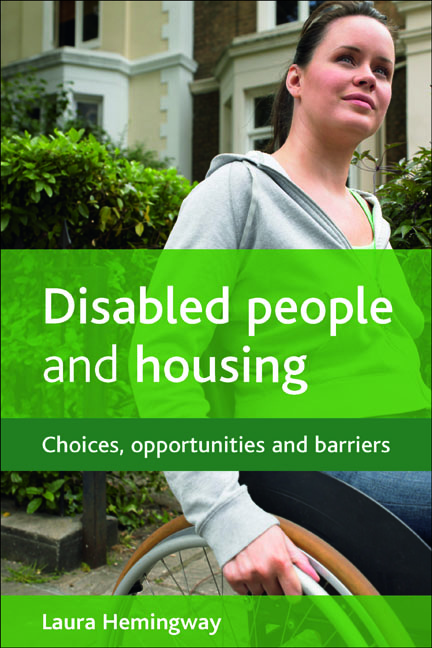Book contents
- Frontmatter
- Dedication
- Contents
- Acknowledgements
- one Introduction
- two Housing policy and disabled people: from past to present
- three Understanding disability: from ‘personal tragedy’ to social disadvantage
- four Physical and communication barriers: the built environment and access to information
- five Financial considerations: income, affordability and risk assessment
- six Attitudinal constraints: assumptions and institutional practices
- seven Creating the ‘home’ in a society of barriers
- References
- Websites
- Index
five - Financial considerations: income, affordability and risk assessment
Published online by Cambridge University Press: 07 September 2022
- Frontmatter
- Dedication
- Contents
- Acknowledgements
- one Introduction
- two Housing policy and disabled people: from past to present
- three Understanding disability: from ‘personal tragedy’ to social disadvantage
- four Physical and communication barriers: the built environment and access to information
- five Financial considerations: income, affordability and risk assessment
- six Attitudinal constraints: assumptions and institutional practices
- seven Creating the ‘home’ in a society of barriers
- References
- Websites
- Index
Summary
The role that financial factors play in the housing and disability relationship is extremely significant, and yet it has been relatively overlooked in UK research. Financial issues affecting housing access and experiences can be broadly defined as including employment security and history; income (including benefits); additional costs relating to impairment, the physical dwelling and life insurance; and issues associated with risk assessment (including credit rating) in the mortgage application process. Whereas some of these factors (such as income and employment) affect access to all housing tenure, others (such as life insurance and risk assessment for housing finance) are more specific to owner-occupation. This chapter shows how a social approach to disability can be used to emphasise these structural constraints, but also stresses the importance of exploring structural factors in further detail, and of recognising the ways impairment is treated by institutions and individual actors. This is shown through the concept of risk, which is significant in terms of understanding how different groups are perceived as more vulnerable or ‘risky’ by the owner-occupation industry and examining how certain groups are classified and measured. Thus, the institutional measuring of risk can be seen as a potentially crucial contributing element within structural factors, generating barriers identified by a social model approach. This chapter is presented in four parts, and several sections are informed from the author's own work in particular. The first examines financial situations common to disabled people in terms of employment, income and living costs, and the implications of affordability for housing options. The second part focuses on access to owner-occupation, looking specifically at risk assessment procedures within lending institutions and the effect that these have had on disabled people. We then take a look at the situation following the recent economic crisis and the potential implications for disabled people in relation to housing. The final part examines potential strategies for addressing some of the barriers identified throughout the chapter.
- Type
- Chapter
- Information
- Disabled People and HousingChoices, Opportunities and Barriers, pp. 99 - 128Publisher: Bristol University PressPrint publication year: 2011



